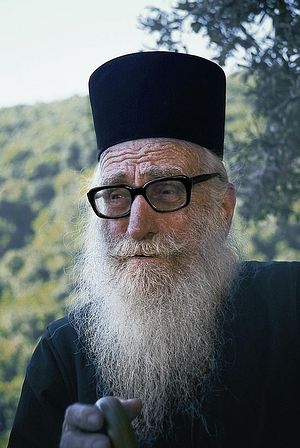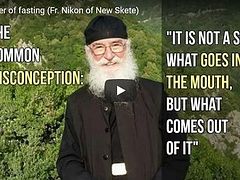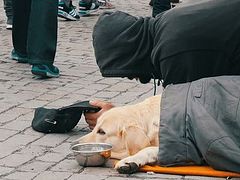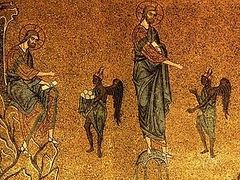Elder Dionisie was one of the most revered Athonite spiritual fathers, one of the last pillars of the “old school” of hesychasm. They called him the “Patriarch of Athos,” and people of various nationalities would visit him from throughout the entire world. Fr. Dionisie departed for eternity on March 11, 2004, having attained to ninety-five years, eighty-one of which he spent in monasteries—seventy-eight on Holy Mount Athos, and sixty-seven in the Cell of St. George “Colciu”—and fifty-seven nourishing numerous spiritual children from all corners of the Earth. We offer here for our readers a conversation with the Elder, dedicated to fasting.
Translator’s note: Some of the questions and answers in this interview are aimed directly at monastics, but any Orthodox Christian can benefit from the spirit of Elder Dionisie’s words, especially as regards his balance of strictness and leniency.
***
 —Fr. Dionisie, tell us about fasting. Christians don’t follow the fasts as well today as they used to. Everyone fasts as he wants…
—Fr. Dionisie, tell us about fasting. Christians don’t follow the fasts as well today as they used to. Everyone fasts as he wants…
—Indeed, everyone fasts as he wants. But not everything happens as we would like.
The fasts were established by the Holy Fathers at the Seven Ecumenical Councils, and, if we observe them, we are given great Divine grace. If you don’t follow them, then it begins here: “Ah, the Apostles’ Fast! Yeah, it’s not so important. The Dormition Fast! I mean, the Theotokos knows that we can’t fast. Great Lent! It’s just too long—seven whole weeks!” And so you fabricate all kinds of excuses for yourself and you completely walk away from the fasts. But if there isn’t fasting, there’s nothing! After all, fasting is Divine grace.
And look, fasting has already been diluted long ago. When I was a boy, in school, people fasted in Great Lent only in the first week and in Holy Week, and in the interval in between them, they allowed themselves to eat everything. But if this is far from the truth,[1] and if you have departed from the truth, it means we’ve already begun to limp. First you’re hobbling on one leg, then on both, until you’re saying: “Oh, God knows! I’m going to live like everyone else.”
Do you see? You have to have a little attention; a little attention and God will help us.
—Indeed, what kind of Christian is it that doesn’t respect fasting? Then it doesn’t matter of what faith you are. You say you are a Christian, but if you don’t fast, then how do you differ from a pagan?
—Do you see how evil progresses? The Catholics have not fasted, and they justify themselves with proofs from Scripture, as they understand it, as if fasting weren’t necessary at all. But the Catholics were at the Seven Holy Ecumenical Councils, since there was no division between us then—however, little by little they reached the point where they no longer fasted.
I was talking with a Catholic nun in Romania in 1939, and she told me: “If I am able, then I don’t eat meat on Holy Friday—if I am able; and if not, then I eat meat.”
On Holy Friday, when the Savior was lifted up on the Cross, Catholics say there’s nothing wrong with eating meat! They also were orthodox Christians like us, and look what happened.
I’m telling you this as an example. After all, look, when someone starts to come down from a mountain, he practically runs; for when you walk down, it’s more difficult to stop. It gets to the point where someone says: “Why should I fast? Scripture says: “What comes out of a man, that defiles him; but what enters into a man, that does not defile him” (cf. Mt. 5:11).
Yes, it is so, and it is not so. All of the fasts were established by the Holy Fathers so that, in fasting, you might diminish your passions. You observe the fast by honoring the Savior’s passion: “I fast because the Savior suffered for me,” and so on. But, in the state that humanity is in now, what else can we expect?[2]
—People say you can’t fast now because if you fast and don’t eat meat, you won’t be able to do physical work.
—You see, people think this way, but it’s a delusion. It is a deception of the enemy, because human nature is full of passions now. And if the passions settle into the mind, heart, and thoughts of a man, they become second nature. If they become second nature, then he begins to say: “If I don’t eat meat, I’ll die. That’s all there is to it.” And with such thoughts, he truly will die!
But it’s not true. This is a passion imposed by the tempter, who manages the storehouse of all evils and throws the seed of evil deeds at us, into our hearts and souls. And if our nature inclines towards one of these evils that he throws at us, then he will henceforth “help” us with this evil. You want to drink vodka—he’ll “help” you with it! You want to eat a little more sumptuous food—he’ll also “help” you with this, until the evil has settled into your soul. You want to tell a lie—he’ll “help” you with it, until the passion takes root, until it sprouts; and if it sprouts, then it already takes root in your heart and soul. And if it has taken root, then this root becomes a second nature, and you are already convinced that if you don’t eat or drink what you want, you will die. But it’s not true! This is the work of the tempter.
That is, the passion that entrenched itself and took root in the human heart is harder to uproot. Therefore, the Holy Fathers teach that every evil thought that exists in our hearts and souls is evident, and we must be certain that it is from the tempter, and make haste to our spiritual father and tell him: “This is what my mind tells me, Batiushka. My mind inclines to this and that”—so your spiritual father may instruct you as the grace of the Holy Spirit enlightens him.
And by doing so, you disgrace the enemy; because if you don’t go to confession, then the passions he introduced into your heart and soul will destroy you. And when you simply can’t find a priest, confess to one another, as the Holy Apostles say,[3] to at least get some help and healing—for you cannot be healed any other way.[4]
—Is there any chance of salvation for monastics who eat meat?
—Look, the Holy Fathers initially decided that monasteries would be built far away from people, that is, in the desert; so monastics, carrying out their repentance could preserve their five senses pure and near to God.
A monk has left the world in order to be nearer to God, because a man living in the world slips into the evil of the world.
The Holy Fathers decided that monks should not eat meat because it inflames the passions more than any other food. If a monk eats in abundance, drinks in abundance, and sleeps in abundance (sleep is especially important), then woe to him—he can no longer be pure.
The passions will overcome you—the carnal passions, which are colossal passions; therefore the Holy Fathers set a limit, for you to preserve yourself: Don’t eat food that inflames the carnal passions.
It’s also necessary for you, a monk, not to sleep in abundance—for you, a monk, don’t need eight hours of sleep. You have to labor; after all, that’s what the monastic life exists for—that you would labor ascetically. Look at what the Holy Fathers write: Even if your food is humble, as it should be for a monk, if you sleep too much, the passions will again vanquish you with their terrible force.
Therefore, watch and pray to enter into the Kingdom of God;[5] that is, don’t sleep as much as the body wants, but let us humble it with prayer and fasting, so the passions might not be inflamed within us.
—What if they eat meat in a monastery? Should we render obedience to the abbot or go somewhere else where they don’t eat it?
—The temptations of the enemy won’t leave you alone, no matter where you go. If you leave the monastery because they eat meat there and go to another, then the enemy has already prepared other temptations for you there. But since you can’t fix things, render obedience, and with time, perhaps, those in charge will decide not to eat meat there anymore, because—glory to the Lord—the monks in the monastery have other things to eat besides meat. If they can’t renounce meat then eat it just so they’ll see that you’re eating some, but not enough to become full.
Meat is not unclean food; it is food given by God, but the Holy Fathers decided that they shouldn’t eat meat under any pretext in monasticism, so that it might be easier to fight with the carnal passions. Therefore they established a penalty for those who eat meat.
But since people have changed and there are disturbances in some monasteries, if monastics don’t eat meat, then you render better obedience, sitting down at the table and eating, if it’s a cenobitic monastery. But eat so that others only see that you are eating; and also do as even the doctors advise—get up from the table with the desire to eat more.




